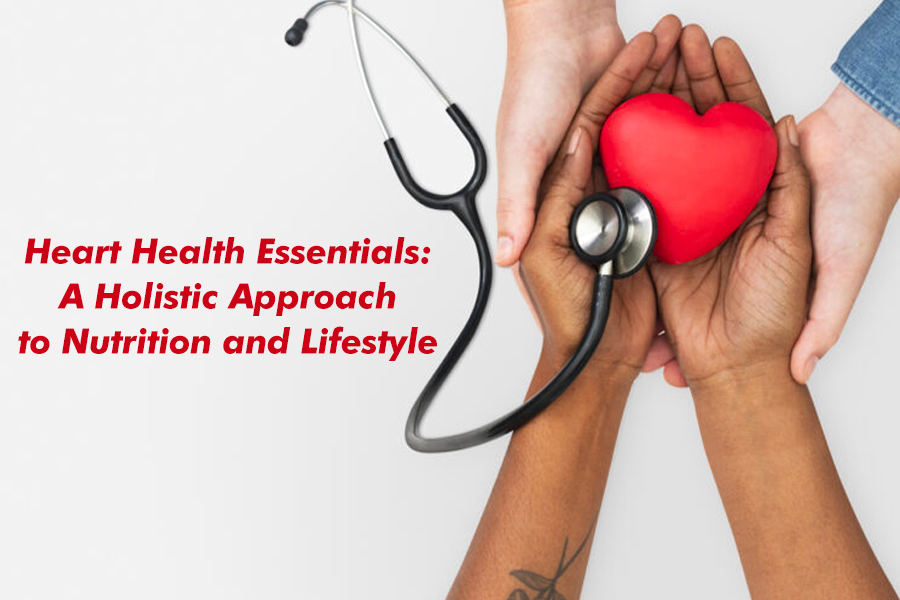Heart Health Essentials: A Holistic Approach to Nutrition and Lifestyle

Healthy living is crucial for maintaining heart health, a concern growing in importance due to increasing cases of heart-related illnesses. This comprehensive approach to wellness encompasses diet, exercise, stress management, and regular health check-ups.
Diet and Heart Health:
A heart-healthy diet is rich in fruits, vegetables, whole grains, and lean proteins. It limits saturated fats, trans fats, and processed sugars. Foods high in omega-3 fatty acids, like salmon, are beneficial for heart health. Portion control and a balanced diet are key.
Exercise for a Stronger Heart:
Regular physical activity is essential for heart health. Activities like walking, cycling, and swimming improve cardiovascular fitness. The American Heart Association recommends at least 150 minutes of moderate aerobic exercise per week.
Managing Stress:
Chronic stress negatively impacts heart health. Techniques such as meditation, deep breathing exercises, and yoga can reduce stress. Adequate sleep and relaxation are also important.
Regular Health Check-Ups:
Regular screenings for blood pressure, cholesterol levels, and diabetes can detect issues early. Health professionals can provide personalized advice and treatment plans.
Lifestyle Choices:
Avoiding smoking and limiting alcohol intake are vital for heart health. Smoking increases the risk of heart disease, and excessive alcohol consumption can lead to high blood pressure.
Understanding the Role of Genetics in Heart Health:
Genetics can play a part in an individual’s heart health. Understanding family history and genetic predispositions helps in early intervention and prevention strategies.
The Impact of a Positive Mindset:
A positive outlook on life can influence heart health. Engaging in activities that bring joy and maintaining a supportive social network can contribute to a healthier heart.
Incorporating Heart-Healthy Supplements:
Some supplements, like omega-3 fatty acids, CoQ10, and fiber, can support heart health. However, it’s important to consult with healthcare providers before starting any supplements.
Balancing Sodium and Potassium
Balancing sodium and potassium intake is crucial for heart health. Sodium, commonly consumed as salt, can raise blood pressure, a risk factor for heart disease. Potassium helps counteract sodium’s effects by relaxing blood vessel walls and helping to excrete sodium. Foods rich in potassium include bananas, oranges, spinach, and yogurt. Moderating salt intake while increasing potassium-rich foods can help maintain a healthy blood pressure balance, reducing the risk of heart-related issues.
Heart-Healthy Cooking Methods
Heart-healthy cooking methods are those that preserve the nutritional value of food and minimize unhealthy fats. Methods like grilling, steaming, and baking are preferable over frying or using excessive oil. Grilling allows fat to drip away from the food, steaming retains nutrients without added fats, and baking can evenly cook foods with minimal oil. These methods help maintain the integrity of foods, such as vegetables, lean meats, and fish, ensuring they contribute positively to heart health.
The Role of Antioxidants
Antioxidants play a significant role in reducing heart disease risk. They combat oxidative stress and inflammation, which are linked to heart disease. Foods high in antioxidants include berries, dark chocolate, nuts, green leafy vegetables, and whole grains. Incorporating these foods into your diet can help protect your heart by reducing arterial damage and improving cholesterol levels.
Staying Hydrated for Heart Health
Staying hydrated is crucial for maintaining heart health. Adequate hydration helps the heart pump blood more efficiently, aids in maintaining proper blood viscosity and volume, and supports optimal blood pressure levels. Dehydration can lead to increased heart rate and potentially higher blood pressure. Drinking sufficient water throughout the day is a simple yet effective way to support overall cardiovascular health.
Community involvement and social connections have a significant impact on heart health. Engaging in a supportive social network can reduce stress, a known risk factor for heart diseases. Positive social interactions and community participation contribute to emotional well-being, which in turn can lead to healthier lifestyle choices. These social aspects are integral for overall cardiovascular health and well-being.
Conclusion:
Adopting a healthy lifestyle is a proactive step towards preventing heart disease and maintaining overall wellness. Simple changes in daily habits can have a significant impact on heart health.






